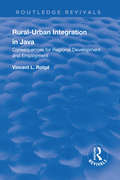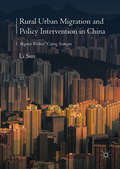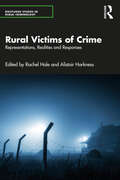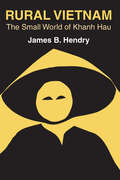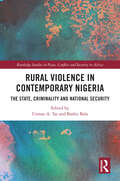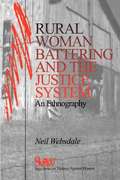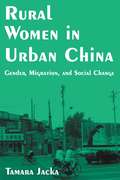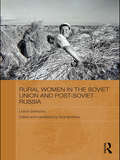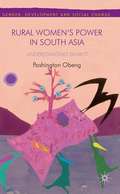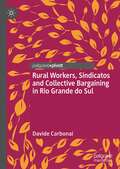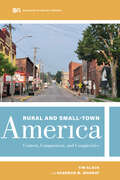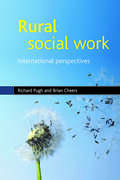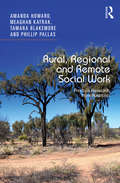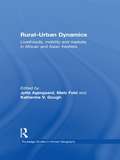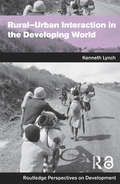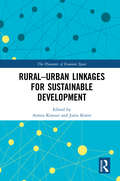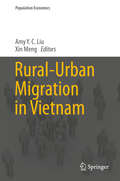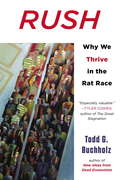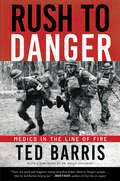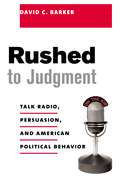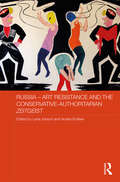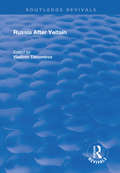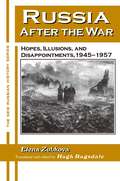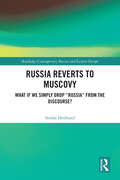- Table View
- List View
Rural Urban Integration in Java: Consequences for Regional Development and Employemnt (Routledge Revivals)
by Vincent L. Rotgé Ida Bagoes Mantra Ryanto RijantaThis title was first published in 2000. Yogyakarta Special Region (known as Daerah Istimewa Yogyakarta in Bahasa Indonesia, or DIY) is located in the centre of the southern coast of Java. The region has a very long history and has undergone many changes and developments in agriculture, irrigation, population and immigration movements. Organized into four main sections, this text aims to provide a study of rural-urban integeration in the area, with particular reference to the consequences of development and employment. It introduces the region in geographical and economic terms, looking at the communities where fieldwork has been conducted. The results of these field studies are then presented, along with possible regional development policies geared towards encouraging the regional integration process. The important questions and implications of increasing rural-urban linkages for urban and societal changes in monsoon Asia are then reviewed on the basis of the lessons learned from the case studies in the DIY. Special attention is given to the consequences for employment and metropolitan changes in the wake of the changes taking place in this region.
Rural Urban Migration and Policy Intervention in China: Migrant Workers' Coping Strategies
by Li SunThis book examines rural-urban migration policies in China, and considers how Chinese workers cope with migration events in the context of these policies. It explores the contribution of migrant workers to the Chinese economy, the impact of changes within the ‘hukou’ system (household registration) and the impact of recent migration policies promoting rural-urban migration and targeting key events during migrant workers’ migration trajectories - job-seeking, wage exploitation, work injuries and illness - namely the corresponding ‘Skills Training Program for Migrant Workers’, the ‘Circular on Managing Wage Payment to Migrant Workers’, the ‘Circular on Migrant Workers Participating in Work-Related Injury Insurance’, and the ‘New Rural Medical Cooperative Scheme’ (Health Insurance). Through in-depth interviews, it examines how when facing such challenges, migrant workers choose to either make a claim under existing policies, or use other coping strategies. The book notably proposes a typology of “coping” which includes a variety of administrative coping, political coping and social coping, and considers how workers in China harness the power of civil groups and social networks.
Rural Victims of Crime: Representations, Realities and Responses (Routledge Studies in Rural Criminology)
by Alistair Harkness Rachel HaleRural Victims of Crime offers a pioneering sustained assessment of ‘the rural victim’. It does so by examining and analysing the conceptual constructs of a victim and challenging the urban bias of victimisation and victimology in criminological study. Indeed, far too much criminological scholarship is based on the false assumption that rural areas are relatively crime free – and thus free, too, of victims. Providing international perspectives, chapters in this edited collection focus centrally on notions of place and space, and constructions of rural victims in a variety of contexts, exploring the impact that geographic location has on the type and prevalence of victimisation. The concept of victimisation is often considered in terms of interpersonal relationships between humans, neglecting the potent impact of victimisation of non-humans and the natural and built environment. Rural Victims of Crime discusses existing notions of victimology in relation to non-human subjects, broadening conceptualisations of the victim and associated impacts resulting from victimisation. Structured in three parts, Rural Victims of Crime conceptualises the rural victim, enhances understanding of the realities of rural victimisation and considers both formal and informal responses to rural victimisation. Chapters are accompanied by practical, contemporary case studies to connect theory with praxis. This book is an essential and valuable resource for academics, students and practitioners alike in the fields of criminology, criminal justice, rural studies, victimology, geography, sociology and spatiality.
Rural Vietnam: The Small World of Khanh Hau
by James B. HendryVietnam is a land whose features change dramatically within short distances--from mountains and high plateaus to coastal plains and inland swamps. To the south, the large delta formed by the Mekong and Lesser river systems inches forward yearly into the South China Sea. This delta, while hardly typical of all Vietnam, is one of the most fertile rice-producing regions of Southeast Asia. Its importance lies not only in the substantial contribution this area can, and will, provide, but it is also the area of most recent settlement by the Vietnamese. The study of its institutions reveals much about the prospects for social and economic change.The analysis of economic change in underdeveloped areas is beset with many complex questions: what factors account for economic activity? Among many signs of change, which are significant? How may one predict the probabilities of future economic development? Rural Vietnam: The Small World of Khanh Hau answers these questions for a Vietnamese rural community, in a detailed study that emphasizes the economic and non-economic factors that shape its present level of material well-being and its chances for future development.The author identifies a variety of forces that influence the economic activity of individuals and finds that these farmers display many more traits of rational economic calculation than is usually assumed to be the case among the peasantry. The book is thus at least a partial refutation of those who hold that village life is so bound by tradition and immersed in lethargy that it cannot be subjected to the kind of economic analyses and policies developed in industrial societies. During the Vietnam war period, Khanh Hau was subject to pressures from far beyond its boundaries, and this study illuminates the problems the conflict engendered throughout Vietnam.
Rural Violence in Contemporary Nigeria: The State, Criminality and National Security (Routledge Studies in Peace, Conflict and Security in Africa)
by Usman A. Tar and Bashir BalaThe book explores the pressing problem of rural violence in contemporary Nigeria by assessing the changing patterns of conflict and response across the country. Rural violence in Nigeria is becoming an increasingly pressing concern, with cattle rustling, banditry, kidnapping and farmer-herder conflicts putting immense pressure on the state’s institutional preparedness and the response capacity of the government, military and other security agencies. Drawing from the expertise of a wide range of African development, governance and security researchers and practitioners, this book assesses the severity of the current problem of rural violence, and provides a critical analysis of the various national and state responses to rural violence in Nigeria. Ultimately, the book aims to provide suggestions for restoring peace, security and development in Nigeria. This book will be of interest to scholars, researchers and administrators across Political Science, Security Studies, Rural Studies, and Regional Studies in Africa.
Rural Woman Battering and the Justice System: An Ethnography
by Neil WebsdaleThe backbone of this book derives from lengthy conversations with 50 rural battered women, resident in various spouse abuse shelters in Kentucky.
Rural Women in Urban China: Gender, Migration, and Social Change
by Tamara JackaBased on in-depth ethnographic research - and using an approach that seeks to understand how migration is experienced by the migrants themselves - this is a fascinating study of the experiences of women in rural China who joined the vast migration to Beijing and other cities at the end of the twentieth century. It focuses on the experiences of rural-urban migrants, the particular ways in which they talk about those experiences, and how those experiences affect their sense of identity. Through first-hand accounts of actual migrant workers, the author provides valuable insights into how rural women negotiate rural/urban experiences; how they respond to migration and life in the city; and how that experience shapes their world view, values, and relations with others. The book makes a major contribution to our understanding of the relationship between gender and social change, and of the ways in which globalization and modernity are experienced at the most personal level.
Rural Women in the Soviet Union and Post-Soviet Russia (Routledge Contemporary Russia and Eastern Europe Series)
by Liubov DenisovaThis is the first full-length history of Russian peasant women in the 20th century in English. Filling a significant gap in the literature on rural studies and gender studies of the twentieth century Russia, it is the first to take the story into the twenty-first century. It offers a comprehensive overview of regulations concerning rural women: their employment patterns; marriages, divorces and family life; issues with health and raising children. Rural lives in the Soviet Union were often dramatically different from the common narrative of the Soviet history, and even during the Khrushchev "Thaw" in the late 1950s and early 1960s, rural women were excluded from its reforms and liberating policies. The author, Luibov Denisova - a leading expert in the field of rural gender history in Russia - includes material from previously unavailable or unpublished collections and archives; interviews; sociological research and oral traditions. Overall, the book is a history of all rural women, from ordinary farm girls to agrarian professionals to prostitutes and paints a unique picture of rural women’s life in the Soviet Union and post-Soviet Russia.
Rural Women's Health
by Belinda Leach Wilfreda Thurston Beverly LeipertThe well-being of rural communities affects the well-being of those who reside in towns and cities because of rural-urban connections through food, drinking water, infectious disease, extreme environmental events, recreation, and for many, retirement residence. In rural areas themselves, women play a critical role in the health of their families and communities, yet women's health is often marginalized or ignored. There have been limited studies to date about rural women and health in Canada. Filling an important gap in scholarship, this collection identifies priority issues that must be addressed to ensure these women's well-being and offers innovative theoretical and methodological ideas for improvement.Rural Women's Health integrates perspectives from rural practitioners, residents, and scholars in a variety of fields, including nursing, sociology, anthropology, and geography, to tackle issues relevant to diverse settings across the country. As such, it presents a national perspective on the nature of women's health while respecting internal and regional diversity, as well as viewpoints from international scholarship.
Rural Women’s Power in South Asia
by Pashington ObengThis book investigates how women's power and caste cleavages often continue to transcend and crosscut the boundaries of caste/tribe, gender, age, class and religion in India, Pakistan and Bangladesh It examines the gendered divisions of labor in rural communities and how countervailing forces have restricted women's status and roles in South Asia.
Rural Workers, Sindicatos and Collective Bargaining in Rio Grande do Sul
by Davide CarbonaiThis Palgrave Pivot provides an overview of rural labour relations in different regions of the State of Rio Grande do Sul, in southern Brazil. Based on rich ethnographic research, through interviews with a long list of rural workers and union members, among others, the study highlights the toughness faced by salaried workers, who deal with difficulties in union representation and, above all, suffer different types of exploitation. Using a systemic approach, this book connects rural workers, union representation, and labour regulation to examine where society has failed and what can be done to protect rural workers.
Rural and Small-Town America: Context, Composition, and Complexities (Sociology in the Twenty-First Century #9)
by Tim Slack Shannon M MonnatContemporary America is centered around urban society. Most Americans reside in cities or their surrounding suburbs, and both the media and modern American sociology focus disproportionately on urban life. Rural and Small-Town America looks at what we can learn from rural society and confronts common myths and misunderstandings about rural people and places. Tim Slack and Shannon M. Monnat examine social, economic, and demographic changes and how these changes pose both problems and opportunities for rural communities. They assess changes in population size and composition, economies and livelihoods, ethnoracial diversity and inequities, population health and health disparities, and politics and policies. The central focus of this book is that rural America is no paragon of stability. Social change abounds, accompanied by new challenges. Through analysis of empirical evidence, demographic data, and policy debates, readers will glean insights about rural America and the United States as a whole.
Rural social work: International perspectives (BASW/Policy Press titles)
by Richard Pugh Brian CheersIn much of the West the concerns of rural people are marginalised and rural issues neglected. This stimulating book draws upon a rich variety of material to show why rural social work is such a challenging field of practice. It incorporates research from different disciplines and places to provide an accessible and comprehensive introduction to rural practice. The first part of the book focuses upon the experience of rurality. The second part of the book turns to the development of rural practice, reviewing different ways of working from casework through to community development. This book is relevant to planners, managers and practitioners not only in social work but also in other welfare services such as health and youth work, who are likely to face similar challenges.
Rural, Regional and Remote Social Work: Practice Research from Australia
by Amanda Howard Meaghan Katrak Tamara Blakemore Phillip PallasThis book gives voice to the direct practice experience of social workers working in rural and remote contexts using Australia as the primary case-study. The authors undertake a qualitative research project, conducting in-depth interviews to examine social work theory and practice against the reality of rural and remote contexts. Practice examples provide the reader with an insight into the diverse and complex nature of social work in rural and remote Australia and the role of contemporary social work. Through placing rural and remote social work in its historical, theoretical and geographical contexts, this work explores a range of considerations. These include isolation; ethical dilemmas when working with small and closely linked communities; climate, disaster relief and the environment; community identity and culture; working with indigenous communities in remote contexts; and social work education. Based on direct practice research, this book challenges existing theories of practice and reframes those to reflect the reality of practice in rural and remote communities. As social work must continue to critically reflect on its role within an ever changing and individualistic society, lessons from rural and remote settings around engagement, sense of place and skillful, innovative practice have never been more relevant.
Rural-Urban Dynamics: Livelihoods, mobility and markets in African and Asian frontiers (Routledge Studies in Human Geography)
by Niels Fold Jytte Agergaard Katherine GoughIt has increasingly been recognised that rural and urban areas are inextricably interlinked. This book adopts a fresh approach to the issue of rural-urban dynamics through a study of the changing nature of livelihoods, mobility and markets in ten study sites across four countries of Africa and Asia. Building on detailed fieldwork conducted in Ghana, Tanzania, Vietnam and Thailand, the authors explore how settlements and livelihoods are being transformed as long-term inhabitants and recent migrants embrace new economic activities many of which are linked to global markets. The book is structured around the concept of ‘frontier’ which is conceptualized as being a dynamic space where the forces of economic, demographic and social change are brought to bear. The study sites include agricultural frontiers (coffee, cocoa, pineapples and fresh fruit), handicraft and manufacturing frontiers, and mining frontiers (gold and diamonds). In all of the cases, global value chain dynamics have played a pivotal role in shaping local livelihoods. Some settlements are developing into new urban centres whilst others are suffering from a boom and bust experience due to the unreliability of export markets. The similarities and differences between the frontier settlements are drawn out by comparing frontiers of similar types and by highlighting the theoretical and policy implications of the findings from all the frontier types. The originality of the book lies in its combination of conceptual clarity, methodological coherence and empirical richness. By combining detailed empirical findings with theoretical insight from debates on livelihoods, global value chains, mobility patterns, settlement dynamics and rural-urban relations, the book sheds new light on these issues within an overall framework of development trajectories in Africa and Asia. Given scholars’ and international agencies’ current interest in the spatial dimensions of economic development, this contribution is particularly timely with its fresh geographical approach to development issues; this book is a pertinent and authoritative read for anyone researching or learning in the field of development.
Rural-Urban Interaction in the Developing World (Routledge Perspectives on Development)
by Kenny LynchSustaining the rural and urban populations of the developing world has been identified as a key global challenge for the twenty-first century. Rural-Urban Interaction in the Developing World is an introduction to the relationships between rural and urban places in the developing world and shows that not all their aspects are as obvious as migration from country to city. There is now a growing realization that rural-urban relations are far more complex. Using a wealth of student-friendly features including boxed case studies, discussion questions and annotated guides to further reading, this innovative book places rural-urban interactions within a broader context, thus promoting a clearer understanding of the opportunities, as well as the challenges, that rural-urban interactions represent.
Rural-Urban Linkages for Sustainable Development (The Dynamics of Economic Space)
by Edited by Armin Kratzer and Jutta KisterThis book critically examines different forms of urban-rural links for sustainable development in different countries. As intertwined processes of globalization, digitalization, environmental challenges and the search for sustainable development continue, rural and urban areas around the world become increasingly interconnected and interdependent. This book contributes to understanding the role of this growing interconnectedness from an economic geographical perspective. It does so by theoretically and empirically addressing the various existing linkages, such as food networks, value chains, and regional governance at local, regional, national and international levels. In doing so, contributions extend and contrast existing approaches dealing with urban and rural areas separately by considering the interplay between these two as well as their consequences for sustainability transition pathways. This edited volume adds to the academic and policy debate by bringing together a variety of concepts and themes in order to shift the research and policy agenda away from simple dichotomy to different notions of rural-urban linkages. Offering multidisciplinary insights into rural-urban linkages, the book will be of interest to decision-makers, practitioners and researchers in the fields of economic geography, regional planning, food studies and economics.
Rural-Urban Migration in Vietnam (Population Economics)
by Amy Y. Liu Xin MengThis edited volume provides a comprehensive overview of rural-urban migration in Vietnam. It addresses a wide range of important topics, including Vietnam’s household registration system (ho khau), migration trends, remittance behaviour and social networking. In addition, it examines migrants’ earnings, their children’s schooling, housing issues and their families’ consumption behaviour in their destination cities.The book is mainly based on new data from the Australian National University's ‘Study of Rural-Urban Migration in Vietnam with Insights from China and Indonesia’ (VRUM) project, which identifies migrants from the large-scale, representative ‘Vietnam Household Living Standards Survey’ 2012 (VHLSS2012). In addition to the data from the VRUM project, the book draws on other widely used data sources to provide a comprehensive picture of rural-urban migrants in Vietnam.By highlighting the issues and challenges brought about by the large-scale rural-urban migration in Vietnam, the book helps researchers and policymakers more effectively formulate policies to respond to those challenges. Moreover, Vietnam’s experience can serve as lessons learnt to other transitional/developing countries.
Rush
by Buchholz Todd G.A former White House director of economic policy makes the outrageous argument that we don't really want to relax-we want to compete. We think we will be happy when we have some downtime-when we can finally go on vacation, disconnect, shut down. But in this provocative book, Todd Buchholz will convince you that what you really want is to chase your tail-even if you never catch it. Weaving in everything from neuroeconomics to evolutionary biology to renaissance art to General Motors, Buchholz will convince you that the race to compete has not only made us taller and smarter, it's what we love and need. Among the book's many counterintuitive takeaways are: * Put off retirement-it can make you stupid. * We all need to be control freaks. * In-house competition is actually great for morale. * Never let the ninth place team take home a trophy. Witty, breezy, and very funny, Todd Buchholz shows that it's the race itself that literally delivers the rush, even if we never reach the finish line. .
Rush to Danger: Medics in the Line of Fire
by Ted BarrisNoted military historian Ted Barris once asked his father, Alex, “What did you do in the war?” What the former US Army medic then told his son forms the thrust of Barris’s latest historic journey—an exploration of his father’s wartime experiences as a medic leading up to the Battle of the Bulge in 1944–45, along with stories of other medics in combat throughout history. Barris’s research reveals that this bloodiest of WWII battles was shouldered largely by military medics. Like his father, Alex, medics in combat evacuated the wounded on foot, scrounged medical supplies where there were seemed to be none, and dodged snipers and booby traps on the most frigid and desolate battlefields of Europe. While retracing his father’s wartime experience, the author weaves into his narrative stories about the life-and-death struggles of military medical personnel during a century of service. In this unique front-line recounting of the experiences of stretcher bearers, medical corpsmen, nurses, surgeons, orderlies, dentists and ambulance drivers, Barris explores the evolution of battlefield medicine at such historic engagements as Fredericksburg, Batoche, the Ypres Salient, the Somme, Vimy, Singapore, Dieppe, Normandy, Falaise, Bastogne, Korea, Iraq and Afghanistan. Barris’s sources reveal—like never before—why men and women sporting the red cross on their helmets or sleeves didn’t flee to safety but chose instead to rush to assist.
Rushed to Judgment: Talk Radio, Persuasion, and American Political Behavior (Power, Conflict, and Democracy: American Politics Into the 21st Century)
by David BarkerConvenient, entertaining, and provocative, talk radio today is unapologetically ideological. Focusing on Rush Limbaugh—the medium's most influential talk show—Rushed to Judgment systematically examines the politics of persuasion at play on our nation's radio airwaves and asks a series of important questions. Does listening to talk radio change the way people think about politics, or are listeners' attitudes a function of the self-selecting nature of the audience? Does talk radio enhance understanding of public issues or serve as a breeding ground for misunderstanding? Can talk radio serve as an agent of deliberative democracy, spurring Americans to open, public debate? Or will talk radio only aggravate the divisive partisanship many Americans decry in poll after poll? The time is ripe to evaluate the effects of a medium whose influence has yet to be fully reckoned with.
Russia - Art Resistance and the Conservative-Authoritarian Zeitgeist (Routledge Contemporary Russia and Eastern Europe Series)
by Lena Jonson Andrei ErofeevThis book explores how artistic strategies of resistance have survived under the conservative-authoritarian regime which has been in place in Russia since 2012. It discusses the conditions under which artists work as the state spells out a new state cultural policy, aesthetics change and the state attempts to define what constitutes good taste. It examines the approaches artists are adopting to resist state oppression and to question the present system and attitudes to art. The book addresses a wide range of issues related to these themes, considers the work of individual artists and includes besides its focus on the visual arts also some discussion of contemporary theatre. The book is interdisciplinary: its authors include artists, art historians, theatre critics, historians, linguists, sociologists and political scientists from Russia, Europe and the United States.
Russia After Yeltsin (Routledge Revivals)
by Vladimir TikhomirovThis title was first published in 2001. This study attempts to present a broad picture of political, economic and social developments in Russia at the start of the 21st century. It provides an overview of the legacy of the Yeltsin era and attempts to outline major limitations and policy choices that Putin is facing. The book contains an in-depth analysis of power stuggles in Russia, the background to Vladimir Putin's rise to presidency, the role of oligarchs and other pressure groups in Russia. There is also a focus on economic, social and financial developments in Russia, with an overview of Russian foreign, military and social policies, as well as looking at its level of development when compared with other countries.
Russia After the War: Hopes, Illusions and Disappointments, 1945-1957 (The\new Russian History Ser.)
by Elena Zubkova University of AlabamaThe years of late Stalinism are one of the murkiest periods in Soviet history, best known to us through the voices of Ehrenburg, Khrushchev and Solzhenitsyn. This is a sweeping history of Russia from the end of the war to the Thaw by one of Russia's respected younger historians. Drawing on the resources of newly opened archives as well as the recent outpouring of published diaries and memoirs, Elena Zubkova presents a richly detailed portrayal of the basic conditions of people's lives in Soviet Russia from 1945 to 1957. She brings out the dynamics of postwar popular expectations and the cultural stirrings set in motion by the wartime experience versus the regime's determination to reassert command over territories and populations and the mechanisms of repression. Her interpretation of the period establishes the context for the liberalizing and reformist impulses that surfaced in the post-Stalin succession struggle, characterizing what would be the formative period for a future generation of leaders: Gorbachev, Yeltsin and their contemporaries.
Russia Reverts to Muscovy: What if We Simply Drop "Russia" from the Discourse? (Routledge Contemporary Russia and Eastern Europe Series)
by Stefan HedlundRussia Reverts to Muscovy explores the implications of removing the notion of “Russia” from political and scholarly discourse.The book posits the following questions: Should the state ruled from Moscow be termed “Russia”? Might not “Muscovy” be more appropriate? It reflects on how academia has conceptualized developments among the Eastern Slavs over the centuries from the early days of Muscovy up until the present-day Russian Federation with the result that by consistently viewing events through a Moscow lens the West has been instrumental in supporting Muscovite claims to hegemony and thus in allowing Moscow to play an outsized role not only in the region but also in global geopolitics. This book highlights the more recent developments of the Muscovite state, and the increasingly hollow nature of the claims of the Russian Federation to represent all of Russia.Exploring how the Eastern Slav world could be conceptualized differently and how this world might develop in reality, this book will be of interest to researchers in International Relations, Ethnic Studies, Political Science, and Central Asian, Russian and Soviet Politics.
